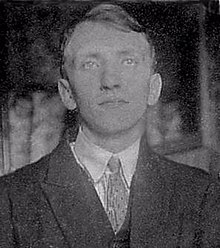
Back Maurice Blanchot Afrikaans موريس بلانشو Arabic موريس بلانشو ARZ Морис Бланшо Bulgarian মরিস ব্লঁশো Bengali/Bangla Maurice Blanchot Catalan مۆریس بلۆنشۆ CKB Maurice Blanchot Czech Maurice Blanchot German Maurice Blanchot Spanish
Maurice Blanchot | |
|---|---|
 | |
| Born | 22 September 1907 Devrouze, Saône-et-Loire, France |
| Died | 20 February 2003 (aged 95) Le Mesnil-Saint-Denis, France |
| Education | University of Strasbourg (B.A., 1922) University of Paris (M.A., 1930) |
| Era | 20th-century philosophy |
| Region | Western philosophy |
| School | |
Main interests |
|
Notable ideas | The Neutral (le neutre) Right to death Two kinds of death[a] |
Preview warning: Page using Template:Infobox philosopher with unknown parameter "influences"
Preview warning: Page using Template:Infobox philosopher with unknown parameter "influenced"
Maurice Blanchot (/blænˈʃoʊ/ blan-SHOH, French: [blɑ̃ʃo]; 22 September 1907 – 20 February 2003) was a French writer, philosopher and literary theorist.[4] His work, exploring a philosophy of death alongside poetic theories of meaning and sense, bore significant influence on post-structuralist philosophers such as Gilles Deleuze, Michel Foucault, Jacques Derrida and Jean-Luc Nancy.
- ^ Max Pensky, The Actuality of Adorno: Critical Essays on Adorno and the Postmodern, SUNY Press, 1997, p. 162.
- ^ Maurice Blanchot, The Station Hill Blanchot Reader: Fiction and Literary Essays (New York, Station Hill Press, Inc., 1999), p. 100.
- ^ Osaki, Harumi, "Killing Oneself, Killing the Father: On Deleuze's Suicide in Comparison with Blanchot's Notion of Death", Literature and Theology (2008) 22(1).
- ^ Kuzma, Joseph. "Maurice Blanchot (1907–2003)". Internet Encyclopedia of Philosophy. Retrieved 24 December 2023.
Cite error: There are <ref group=lower-alpha> tags or {{efn}} templates on this page, but the references will not show without a {{reflist|group=lower-alpha}} template or {{notelist}} template (see the help page).